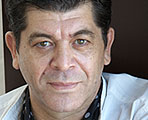Interview DeFlamenco.com
«I think people in Madrid don't appreciate what's unfamiliar to them»
|
Tomás Fernández Soto was born in Utrera (Seville) into a gypsy family of flamenco singers. He is the son of José Fernández Granados (Perrate de Utrera) and Tomasa Soto Loreto (daughter of the legendary singer Manuel Torre). Tomás won the Giraldillo for Best Newcomer in the Bienal of 2002, and come September, he’ll be singing in the Bienal once again. He recently made a record, “Infundio”, and Saturday June 23rd it’s being presented within the series Noches Brujas de Flamenco at Madrid’s Corral de la Morería. He also talks about his participation in Israel Galván’s upcoming show to be presented at Madrid’s Teatro Real on December 12th of this year. How’s your new record “Infundio” doing? Considering the state of the recording industry, and people still make records… The need to keep making records is obvious, it’s your calling card, and in my case, the motif of a show. Personally, I understand the recording industry is in crisis, but we have to redesign the methods of distribution and lower the profit margin to cover demand…there’s a need to hear new artists. Not long ago we saw you do a concert called “Entre Tejas” on a Seville roof-top. What was that like? It was on the roof of a cultural center in Seville, in the early evening with the fragrance of spring in the air, an ideal setting in the heart of the city with the Giralda for a backdrop, a wonderful experience, very inspiring. This weekend, the 23rd or 24th, Teo Sánchez is going to put some of that recital on his program “Duendeando”. And now you’re featured in the series Noches Brujas at Corral de la Morería within the Suma Flamenca festival. What guitarist are you bringing? I have great expectations for Madrid, anxious to know and be known by the Madrid audience. Although I’ve been here many times, I’m still unknown, only a few hardcore flamenco fans know me. I’m going to be accompanied by my good friend, guitarist Antonio Moya, and we’re determined to give our all. These are not good times for concerts, festivals and such… That’s right…the recession is terrible for cultural activities, although personally, I can’t complain…it seems like finally all the years of struggle are finally paying off. You’re in the Bienal de Sevilla this year, an important event. Yes, thank god for the Bienal de Flamenco de Sevilla, they’ve been counting on me ever since the 2002 edition when I won the Giraldillo for best newcomer, and it’s an honor for me to participate in this international flamenco showcase. What’s the state of flamenco in Utrera now that the great stars are no longer with us. The weight of responsibility to represent the cante of Utrera falls upon you for the most part…are there young singers in town? Did your illustrious father ever hear you sing? Did he actually teach you, or did you learn on your own along the way? «Without a doubt there is a distinct Utrera sound”. Without a doubt there is a distinct Utrera sound. The main characteristic of that sound is that it gravitates toward more rhythmic musical forms as opposed to free-form cante. In bulerías, it seems everyone elsewhere wants it to be a fiesta, speeding up the tempo, but in Utrera the rhythm of bulerías is more solemn, it resists the vertigo of other places and languishes in gentle acceleration. In soleá, the opposite happens, although it is by nature a solemn form with a great deal of spiritual baggage, it’s interpreted with a more upbeat tempo than in other parts of the flamenco geography. And this kind of subtlety is what goes into the magic of Utrera compás, which is nothing more than a differentiating of flavors, something not easily explainable, but more than obvious to flamenco followers. You are the grandson of the mythical Manuel Torre. How does that sit with you? Does it weigh you down or inspire you? Do you feel appreciated in Madrid? How is the Madrid audience for flamenco singing, is it a different taste? I think people in Madrid don’t appreciate what’s unfamiliar to them, and the flamenco from around the Guadalquivir, Alcalá, Morón, Lebrija and Utrera is relatively little-known, even being the seat of the oldest flamenco. I’d like to transmit some of that to Madrid flamenco fans. «I don’t distinguish between singing for dance and singing solo, singing is singing, it’s a quest for beauty« You always hear that singing for dance is an obligatory part of any flamenco singer’s experience. In Utrera there isn’t a lot of dance, have you sung for dancers, or do you prefer solo singing? I don’t distinguish between singing for dance and singing solo, singing is singing, it’s a quest for beauty…between two people if there’s a guitarist, between four if there are two people doing palmas, or five if there is a dancer. The energy sent out from the stage is always shared, even with the listener or observer, it’s never something you do alone.
|
